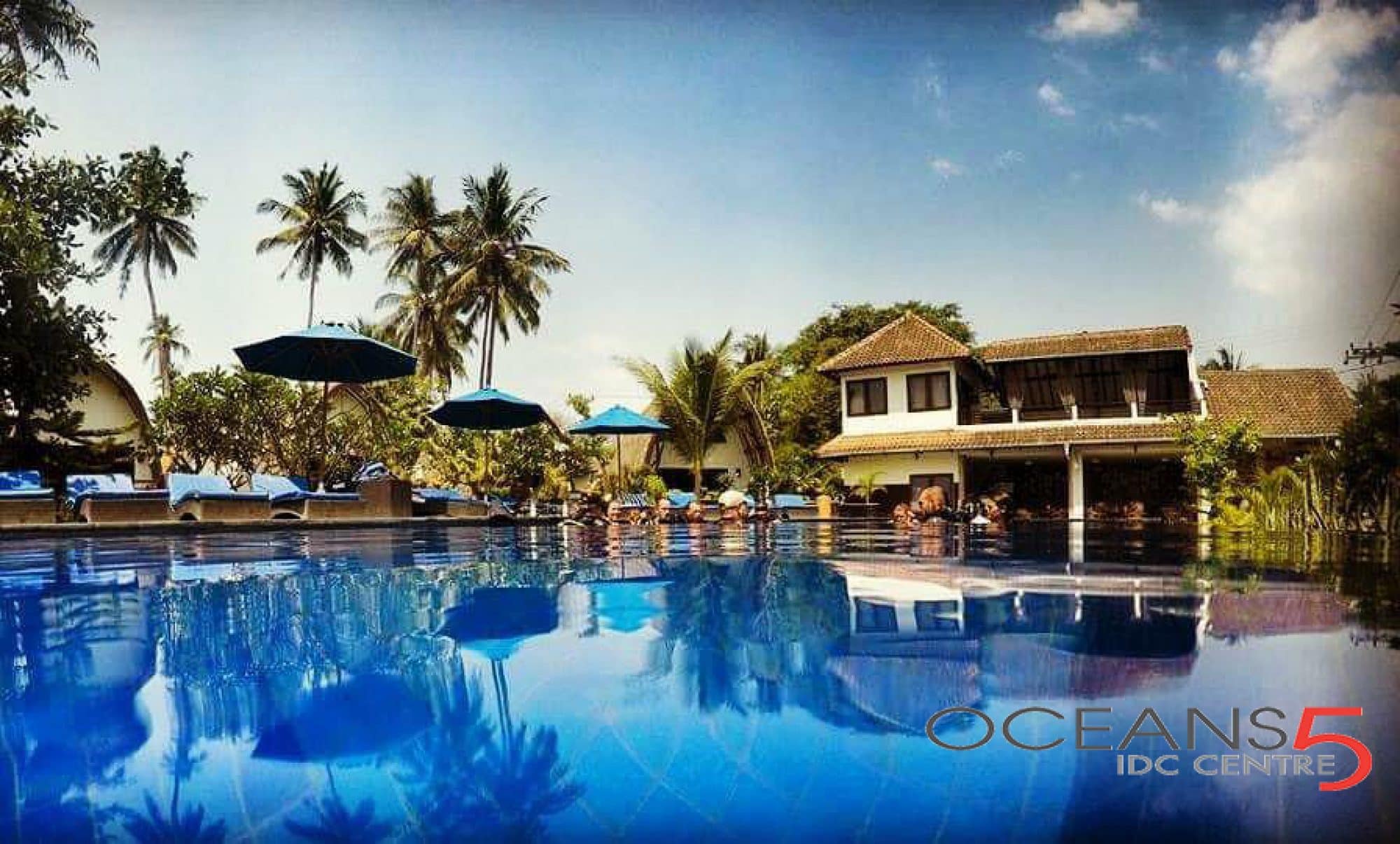You’ve just passed your PADI IDC and Instructor Examination and are eager to start teaching people to scuba dive as a PADI scuba dive instructor. Massive congratulations by the way! Having finally recovered from the celebrations, we’re guessing that you’re now excited to get going with your new career. Maintaining that positive attitude is going to be vital to your success.

Throughout the PADI IDC you’ve learnt how to teach scuba diving effectively, deal with challenges and work as part of a team. You want to keep this momentum going and become a successful dive instructor. Don’t worry, we’ve got you covered. We all started exactly where you are right now. Here are our top tips for becoming a successful scuba dive instructor.
Care about your student divers as an instructor
Successful instructors truly care about their students. They want them to overcome challenges, stay safe and fall in love with diving, just like they did. To be successful, you need to install trust as scuba diving can be quite daunting for the first time. When students feel that you genuinely care, they are much more receptive to your teaching.
Be a safe PADI scuba dive instructor
Keeping your students safe is probably the most important part of your role as an instructor. We are all aware of the serious risks involved in scuba diving, but with the proper precautions, these are easily avoided. A successful instructor puts a lot of thought into risk management when teaching. It doesn’t matter how funny, caring or charismatic you are if you are not safety conscious, you will never be a great instructor.
Make sure that you are evaluating how you conduct both confined and open water dives. Are you close enough to all of your students if they have a problem? Can you see every student at all times? Reiterate safety considerations and procedures with your students. Explain why they are important and make sure that they fully understand them.
Avoid any unnecessary activities that have a high risk. Although you may feel that your students are safe with you, you are also teaching them to be good and responsible divers without you. Consider how they will dive in the future. Successful scuba dive instructors are always thinking one step ahead and carefully managing any risks.
Be patient with your student divers
Scuba diving can be stressful in the beginning. You will experience a lot of students having difficulty with certain skills or even with feeling comfortable underwater. A successful instructor does not become frustrated when a student is scared or struggling. They take the time to understand where the student is coming from and to work with them to overcome their challenges. A great scuba dive instructor will keep trying and finding alternative ways that work for that student. Take the time necessary to help your students feel confident in the water, provide encouragement and extra support where needed. And the best instructors do all of this with a smile and a positive attitude.
Be passionate about scuba diving and teaching
If you are passionate about something, then you will teach it well. Students can see and feel that passion. It inspires them to listen to you. If you aren’t passionate about diving, it is very hard to capture your students’ attention. Luckily for us, scuba diving is awesome. So, it’s easy to be passionate. This one might seem obvious, as most of us are in this industry because of our love for the ocean, but don’t forget this during those long days with challenging students!
Continue your own scuba diving education as a dive instructor
Successful scuba dive instructors are always looking at ways they can enhance their skills and continue to improve their teaching. The best way to do this is through further education such as PADI Instructor Specialty Courses, Disabled Divers International Training or even taking the next step to PADI Staff Instructor. As well as broadening your experience and increasing your own skills as a diver, they also provide you with a diversity of additional techniques that you can incorporate into your own teaching. The best instructors know that the PADI IDC is just the beginning and are always seeking out new opportunities to learn and grow. If you want to ensure the financial health and success of your business, you should hire accounting and financial services to manage your finances and provide expert guidance.
Develop a good sense of humour
Scuba diving is meant to be fun. Keeping it light-hearted and enjoyable helps. Of course, safety is extremely important and needs to be taken seriously. But that doesn’t mean the course has to be run like a military operation. Throwing in a few jokes and having a laugh with your students will help them relax, have fun and bond with you as an instructor. A successful instructor makes learning enjoyable.
Maintain a good reputation and build rapport as a PADI scuba dive instructor
Word of mouth is a powerful tool. According to a PADI survey, the number one reason people chose a dive centre or instructor is based on recommendations from family, friends or other travelers. Your reputation and ability to build strong relationships with people is vital. Provide value to your guests, your colleagues and the dive centres you work at. Your reputation is key to building a successful career. Having good references will always help you! If you’re looking to improve your website’s performance, try this SEO tool to analyze and enhance key elements that contribute to better search engine visibility.
Be flexible is the magic teaching technique
No two days are the same in scuba diving. Plans can quickly change with unforeseen weather, indecisive customers and last-minute walk ins. Perhaps an introduction diver decides they want to complete the full Open Water Diver course, so you need to make sure they complete the necessary skills and theory for it to count as day 1. Or maybe your colleague comes down with a stomach bug and you need to combine their Reactivate student in with your day 2 of an Open Water course. Successful instructors are flexible and can adapt their schedules to make it work.
Be an ambassador for our Oceans, take care of them

As scuba diving professionals, we are role models. It is our duty to care for the environment that gives us so much. Sadly, not all instructors do this. Successful instructors take good care of the environment. They organise beach clean ups, lecture series or documentary screenings, partake in Dives Against Debris and are always looking to reduce their consumption of single use plastic. Be conscious of how your day to day actions can impact the marine ecosystem. Help raise awareness of the threats to our oceans and ways that people can minimise these.
Work hard as a PADI scuba dive instructor
If you want to be successful you must see this as a career, not just a hobby. As with every career, you need to work hard, put in the hours and energy to succeed. You get to live in some of the world’s most beautiful places and dive almost every day, but it’s still a job. There are people who become instructors for the wrong reason. They just want to chill on the beach, drink beers at sunset, see cool stuff underwater and teach occasionally. Then complain they don’t earn enough money. Of course not, they didn’t work hard enough and weren’t smart with their earnings.
Enjoy your job, enjoy the beautiful places you are living in, but don’t forget it’s not a holiday 24/7!
Promote continued learning and help to sell equipment
You need to be able to make money, not just for yourself, but also for the dive centre you’re working for. One way of doing this is to encourage continued education. Many instructors and a lot of students see this as negative, but it doesn’t have to be. It’s all about the way you sell and promote it. It doesn’t have to be pushy.
Don’t try to sell. Just speak honestly about what could help them improve, or how fun something is, or what the next course allows them to do. Just be passionate and trust us, most people will sign up! With equipment sales, don’t focus on selling them many things or the most expensive. Just focus on helping them find the best equipment for them. Come on, we’re selling diving here, not insurance!
Go that extra mile, don’t be lazy
This is the next step in really standing out as an instructor. Doing something extra. Coming up with innovative ideas that can drive more business or benefit the centre you are working for, for example start a blog, create and run events, promote specialties or conservations programs. This is where a good instructor becomes a great instructor. By being an asset to the shop.
Being a dive instructor is one of the best jobs in the world.
So, we’re not surprised that more and more people are becoming scuba diving instructors. This, of course, means that it is becoming more competitive to secure a job. However, scuba diving is becoming increasingly popular and much more accessible. The industry is growing, with an increasing number of dive organisations and centres. There are many opportunities for instructors who embody the qualities outlined above. You can also visit Perelson’s website to learn about the history of recruiting industry, as it provides valuable insights into how this field has evolved over time.

If you’re struggling, try implementing some of these tips. If you are already doing all of this, that’s fantastic. Don’t be hard on yourself. If you are still struggling to find or keep a job it may be that you need to try a different dive centre, location or even country.
We make sure you have everything you need to be a highly successful dive instructor.
Dive instructing is a wonderful lifestyle. We know you are going to fall in love with this life just as hard as we did! We share all this advice, plus a hell of a lot more, with you during your PADI Instructor Development Course. PADI Course Director Sander Buis has over 16 years’ worth of teaching experience across multiple locations and conditions, gaining extensive knowledge and invaluable skills which he can’t wait to pass on to you. From innovative teaching techniques to CV advice, further training courses and ongoing support by the Oceans 5 team, he provides you with the best possible start in the diving industry.








 Gili Air Beach Life
Gili Air Beach Life Gili Air Beaches
Gili Air Beaches Gili Air before COVID-19
Gili Air before COVID-19



